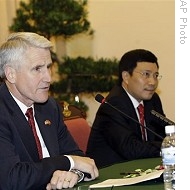VOA标准英语10月-US, Vietnam Hold First Political-Military Dialogu(在线收听)
 |
| US Assistant Secretary of State for Political Military Affairs Mark Kimmitt (L) speaks during news conference in Hanoi as Vietnamese Deputy Foreign Minister Pham Binh Minh listens, 06 Oct 2008 |
U.S. Assistant Secretary of State Mark Kimmitt says the talks in Hanoi touched on a wide range of security affairs.
"Primarily peacekeeping, military assistance, security assistance, potential arms transactions, [that are] lethal, [and] non-lethal, and a host of other issues of mutual concern," he said.
Vietnamese Deputy Foreign Minister Pham Binh Minh calls the talks, which ended Monday, productive.
Minh says the dialogue helped contribute to the strengthening of ties between Vietnam and the U.S.
The Vietnamese military has asked the U.S. to supply spare parts for its American-made helicopters, leftovers from the Vietnam War. The two governments also discussed integrating Vietnamese soldiers into United Nations peacekeeping operations, and American military help with disaster relief in Vietnam.
U.S. Deputy Assistant Secretary of Defense James Clad, who was also at the talks, says Washington simply wants to develop the same kind of military cooperation with Vietnam that it already has with other countries in the region.
"It would be incorrect to cast it is as something very bilateral. We have, for example, routine exchanges with the Malaysians, with the Indonesians, with the Filipinos, with the Thais. And I think as a large ASEAN country, Vietnam is more and more coming into that world," he said.
Experts generally see the growing U.S.-Vietnamese security relationship as an effort by both to balance rising Chinese power. China and Vietnam have a dispute over the ownership of two island groups in the South China Sea which may hold rich undersea oil deposits.
But Clad says the U.S. wants Vietnam and China to have good relations, to promote regional stability.
Martin Gainsborough, a Vietnam expert at Bristol University in Britain, says the talks carry promise for Vietnam, but also domestic political risks.
"Individual leaders that are, in a sense, fronting this dialogue - they have to be careful personally that they're not seen as leaning too heavily toward the U.S. Again, not least because of the relationship with China," he said.
The two sides hope to make the talks an annual event. The next meeting is scheduled for autumn 2009 in Washington.